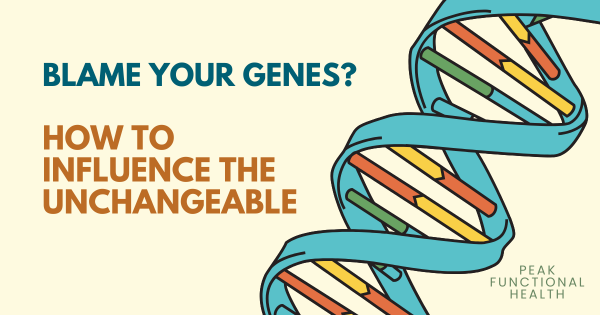Blame Your Genes? How to Influence the Unchangeable

Why Genetics Matters—but Doesn’t Define You
In our previous analogy comparing symptoms and diagnoses to the branches of a tree, we explored how chronic conditions are often just outward signs of something deeper. The real causes lie beneath the surface—at the roots.
This concept alone can be transformative. Think about how often you’ve found yourself in a doctor’s office for a cold, a rash, or a flare-up. You likely walked out with something to treat the issue—maybe a medication, maybe a protocol. And often, it worked. But what rarely gets asked is: Why was your body susceptible to the issue in the first place?
Today, we go deeper into one of the Three Roots that lies beneath the symptoms: Genetics.
But before we go any further, let’s make one thing clear:
Genetics is not your destiny. But it can be your starting point.
What Genetics Really Tells Us
Genetics refers to your inherited biological blueprint—the unique code you’re born with. It’s shaped by thousands of years of ancestral survival, adaptation, and biology. Within that code are single nucleotide polymorphisms (SNPs)—tiny variations in your DNA that may influence your susceptibility to certain conditions or metabolic imbalances.
It’s why two people can live in the same environment, eat the same foods, and experience very different health outcomes. It’s why one person thrives under pressure, while another breaks down.
It also helps explain the frustration so many people feel when "healthy" doesn’t work the same for them as it does for someone else. I once watched a news interview with a 100-year-old man who credited his longevity to drinking a daily diet soda. Genetics helps us see through anecdotes like that to the bigger picture of bioindividuality.
The bottom line? Genetic predisposition is not the same as genetic expression.
Epigenetics: The Bridge Between Genes and Health Outcomes
Your genetic code may be fixed, but your epigenetics—the factors that influence how genes are expressed—are very much within your control.
Think of your genes like light switches. Epigenetic factors determine whether those switches get turned on or off.
What influences gene expression?
The food you eat
The toxins you’re exposed to
Your stress levels
Your sleep, movement, and environment
Your relationships, personal history—even your thoughts
When you learn to influence these factors, you become a master of your epigenetics. This is where Functional Nutrition steps in—helping you shift your internal terrain to support better outcomes.
Emerging sciences like nutrigenomics and metabolomics support this approach. Nutrigenomics explores how food can turn genes on or off. Metabolomics tracks how your body generates and uses energy, revealing patterns that can help pinpoint root causes.
For example, sugar has been shown to activate genes related to inflammation and immune suppression. In contrast, whole foods rich in phytonutrients support detoxification and cellular repair.
Your genes provide the context. Your environment and habits provide the instructions. Understanding your genetic root doesn’t doom you—it informs you. It helps answer:
Why do I react differently to stress than others?
Why do I get sick more often, even when I “do everything right”?
Why did a diet or protocol work for someone else but not me?
Instead of feeling defeated, you can feel equipped. You can begin to tailor your approach to what actually works for your body.
Takeaway: You Are Not a Victim of Your Genes
For this reason functional nutrition doesn’t treat genetics as a life sentence. We use it as a roadmap for personalized care, to help you:
Understand your genetic predispositions
Identify lifestyle and environmental triggers
Make sustainable changes to shift your terrain
Partner with your body instead of fighting it
You may have been dealt a certain genetic hand. But you still get to choose how you play your cards.
Coming Next: Digestion – The Second Root
In the next blog in this series, we’ll dive into another foundational root: Digestion. You’ll learn why we often begin here when unraveling chronic symptoms—and how restoring gut health can transform everything from mood to metabolism.